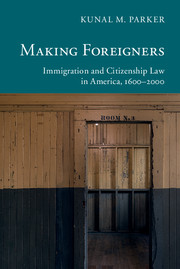
-
Select format
-
- Publisher:
- Cambridge University Press
- Publication date:
- 05 September 2015
- 31 August 2015
- ISBN:
- 9781139343282
- 9781107030213
- 9781107698512
- Dimensions:
- (228 x 152 mm)
- Weight & Pages:
- 0.53kg, 272 Pages
- Dimensions:
- (228 x 152 mm)
- Weight & Pages:
- 0.38kg, 272 Pages
- Subjects:
- American History: General Interest, Legal History, Area Studies, American Studies, Law, History
- Series:
- New Histories of American Law
You may already have access via personal or institutional login- Subjects:
- American History: General Interest, Legal History, Area Studies, American Studies, Law, History
- Series:
- New Histories of American Law
Book description
This book reconceptualizes the history of US immigration and citizenship law from the colonial period to the beginning of the twenty-first century by joining the histories of immigrants to those of Native Americans, African Americans, women, Asian Americans, Latino/a Americans and the poor. Parker argues that during the earliest stages of American history, being legally constructed as a foreigner, along with being subjected to restrictions on presence and movement, was not confined to those who sought to enter the country from the outside, but was also used against those on the inside. Insiders thus shared important legal disabilities with outsiders. It is only over the course of four centuries, with the spread of formal and substantive citizenship among the domestic population, a hardening distinction between citizen and alien, and the rise of a powerful centralized state, that the uniquely disabled legal subject we recognize today as the immigrant has emerged.
Reviews
'Kunal Parker has accomplished the remarkable feat of challenging us to think differently about concepts - what it is to belong, what it is to be alien - that once seemed simple. Untangling the complexities of immigration from the Pilgrims to the Dreamers with a brilliant clarity, [he] traces the way that changing meanings of citizenship have been accompanied by paradoxical redefinitions of what it is to be foreign. As we struggle in our own political moment to reform immigration law, Making Foreigners offers indispensable perspective.'
Linda K. Kerber - University of Iowa
'In Making Foreigners, Kunal Parker shows how American law defined alienage and citizenship in ways that have confounded simple oppositions of insider and outsider. [He] provides a powerful analysis of how various groups ‘native’ to American territory have been constructed as ‘foreigners’ in both law and society. Making Foreigners is a tour de force that makes us rethink how the very notion of being ‘foreign’ has little to do with where one might stand in relation to territorial boundaries.'
Mae Ngai - Columbia University, New York
'In this breathtakingly sweeping, yet concise, 400-year history, Kunal Parker highlights how through much of American history both immigration and citizenship law rendered individuals and entire groups, from both inside and outside the territorial borders of the United States, ‘foreign'. In doing so, he challenges the dichotomy between insiders and foreigners and opens to question the current immigration and deportation regime.'
Barbara Welke - University of Minnesota
'Making Foreigners offers important insights about the relationship between the nation’s treatment of domestic minorities and foreigners.'
Kevin Johnson Source: The Journal of American History
'Making Foreigners manages to contribute to the scholarship in the areas of: U.S. immigration law and policy, Latino Studies, Native American Studies, African American studies, women’s studies, Asian Americans, and studies of the poor … the book lays out a provocative new thesis that deserves serious discussion and engagement.'
Anna O. Law Source: Law and Politics Book Review
'Provides a sweeping and bold reconceptualization of the history of American immigration and citizenship law. … The history of restrictive immigration law and the legal disabilities of the foreign-born in the United States, Parker argues, must be examined in tandem with multi-layered political and legal structures reducing various groups of native-born insiders, such as women, African Americans, Asian Americans, Latino Americans, American Indians, and the poor, into second-class citizens or virtual foreigners in their status and rights. … Parker's broad conceptualization of immigration and citizenship law has enormous value for historians of American immigration and ethnicity. … truly a laudable addition to American historical and legal scholarship.'
Hidetaka Hirota Source: Journal of American Ethnic History
'Presents a long-term view of America’s struggle over defining cultural and legal others, from those coming from outside the borders to those born within them. … Parker shows throughout how native-born citizens, in effect ‘native-born foreigners’, continued to share legal disabilities with aliens not just through cultural discrimination but also through the law itself. … Parker’s book is a very welcome synthesis of a long (and ongoing) story.'
Nancy L. Green Source: The American Historical Review
'Parker’s work sheds light on the ways political and legal shifts have allowed the American state to incorporate outsiders, while also rendering insiders foreign … The expansive timeline and ambitious scope of Parker’s argument provides a fresh and exhaustive overview of immigration and citizenship history. Highly Recommended.'
Ashley Johnson Bavery Source: Reviews in American History
Contents
Metrics
Altmetric attention score
Full text views
Full text views help Loading metrics...
Loading metrics...
* Views captured on Cambridge Core between #date#. This data will be updated every 24 hours.
Usage data cannot currently be displayed.
Accessibility standard: Unknown
Why this information is here
This section outlines the accessibility features of this content - including support for screen readers, full keyboard navigation and high-contrast display options. This may not be relevant for you.
Accessibility Information
Accessibility compliance for the PDF of this book is currently unknown and may be updated in the future.


